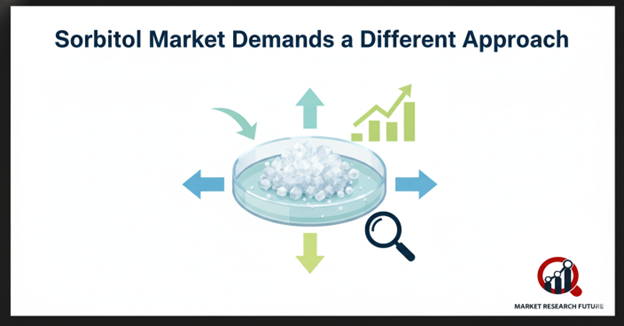Sorbitol Market Demands a Different Approach

Sorbitol Market Overview
Sorbitol, also known as glucitol, is a naturally occurring sugar alcohol widely used as a low-calorie sweetener in food, pharmaceuticals, and personal care products. Found naturally in fruits such as pears, apples, peaches, prunes, apricots, and bananas, sorbitol has been recognized for centuries as a versatile and safe ingredient. Its low glycemic index, non-cariogenic nature, and stabilizing properties make it an important additive across industries seeking healthier and more sustainable sugar alternatives.
The global demand for sorbitol is rising due to the increasing focus on sugar reduction, diabetes management, and functional food formulation. Moreover, its diverse industrial applications—from food & beverages to pharmaceutical syrups, toothpaste, and cosmetics—are driving sustained market expansion.
What is Sorbitol?
Sorbitol is a polyol (sugar alcohol) derived from glucose through the process of hydrogenation. It provides about half the calories of sugar, delivering mild sweetness without significantly impacting blood sugar or insulin levels. Sorbitol can be found in solid (crystalline) and liquid (syrup) forms, each suited for distinct uses in manufacturing and product formulation.
Key properties of sorbitol include:
- Low-Calorie Sweetness: Approximately 60% as sweet as sucrose, providing sweetness with reduced caloric content.
- Non-Cariogenic: It is not metabolized by oral bacteria, preventing tooth decay.
- Moisture Retention: Ideal for maintaining texture and freshness in baked goods and confections.
- Stability: Resistant to crystallization, enhancing shelf life in syrups and oral care products.
Applications Across Industries
1. Food and Beverages
Sorbitol is extensively used as a low-calorie sweetener, humectant, and texturizing agent in sugar-free candies, chewing gum, dietetic foods, jams, and bakery products. Its smooth, cooling mouthfeel enhances consumer appeal while maintaining product stability.
2. Pharmaceuticals
In pharmaceuticals, sorbitol syrup is used as a sweetening agent and stabilizer in cough syrups, vitamin tonics, and oral suspensions. It improves palatability and acts as a bulking agent in tablets and capsules.
3. Personal Care & Cosmetics
Sorbitol’s humectant properties make it a preferred ingredient in toothpaste, mouthwash, lotions, and creams, helping retain moisture and prevent drying.
4. Industrial Applications
Beyond consumer products, sorbitol serves as a key intermediate in the production of vitamin C (ascorbic acid) and resins, and in textile finishing and paper manufacturing as a softener and conditioning agent.
Key Market Growth Drivers
- Rising Demand for Low-Calorie Sweeteners
Growing health concerns over obesity, diabetes, and metabolic disorders are driving demand for natural, low-calorie sweeteners. Sorbitol provides a safe, FDA-approved alternative to sugar, appealing to health-conscious consumers.
- Expanding Pharmaceutical and Cosmetic Applications
Increasing use of sorbitol in oral care, skincare, and pharmaceuticals—owing to its moisturizing and stabilizing characteristics—is contributing to sustained market growth.
- Regulatory Support and GRAS Status
Sorbitol is classified as Generally Recognized as Safe (GRAS) by the U.S. FDA, promoting its adoption in diverse applications globally.
- Technological Advancements in Production
Innovations in hydrogenation processes and feedstock utilization (such as corn syrup and high fructose corn syrup) have improved production efficiency and product quality, making sorbitol more commercially viable.
- Sustainability and Natural Origin
As consumer preference shifts toward plant-derived and eco-friendly ingredients, sorbitol’s natural origin gives it a competitive advantage over synthetic sweeteners.
Market Challenges
Despite its widespread acceptance, the sorbitol market faces certain challenges:
- Digestive Sensitivity: Excessive consumption may lead to gastrointestinal discomfort in sensitive individuals.
- Price Fluctuations in Raw Materials: Dependence on glucose or corn-based feedstock links sorbitol prices to agricultural volatility.
- Competition from Other Polyols: Alternatives such as xylitol, erythritol, and mannitol present strong competition due to varying sweetness profiles and digestive tolerability.
- Limited Awareness in Emerging Markets: Consumer knowledge about the benefits and uses of sorbitol remains low in developing economies.
Regional Insights
- North America: Leads the global sorbitol market due to widespread use in food, beverages, and oral care products, supported by strong health-conscious consumer demographics.
- Europe: Growing adoption in pharmaceuticals and personal care, coupled with regulatory support for sugar substitutes, drives market growth.
- Asia-Pacific: Expected to witness the fastest growth owing to rising disposable incomes, expanding food processing sectors, and increased use of low-calorie sweeteners in countries like China, India, and Japan.
- Latin America & Middle East/Africa: Emerging opportunities exist due to increasing awareness of sugar-free products and expanding industrial manufacturing capabilities.
Future Outlook
The Sorbitol Market is set to experience steady growth over the next decade, supported by the global shift toward healthier lifestyles, clean-label ingredients, and sustainable manufacturing. Companies are expected to invest in R&D to enhance taste profiles, improve digestion tolerance, and expand industrial applications.
Moreover, integration with biotechnology advancements and eco-friendly production processes will ensure that sorbitol remains a cornerstone ingredient in the future of functional foods and personal care formulations.
Conclusion
Sorbitol’s growing acceptance across food, pharmaceutical, and personal care industries marks it as a versatile and sustainable sugar substitute for the modern world. Backed by regulatory approvals, health benefits, and manufacturing innovation, the market continues to evolve toward value-driven, health-focused applications. With rising consumer awareness and technological progress, sorbitol is poised to play a key role in shaping the next generation of low-calorie, functional products.

Leave a Comment